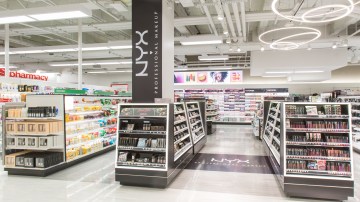Sephora has upped the ante on its Beauty Insider rewards program, adding more redeemable products, altering its points system and increasing reward options.
The new changes will be rolled out throughout August, and come after over a year of internal research by Sephora that included online and over the phone surveys, focus groups, and looking at innovations from other loyalty programs such as gamification. The last time the program saw major changes was in 2013 with the launch of the “Rouge” tier – the third tier in the program reserved for those who spend at least $1,000 in a year; the other two tiers are “Insider” and “VIB.” Insider is free to join, and customers are upgraded to VIB (or Very Important Beauty Insider, created in 2009) after spending at least $350 in a year. As the retail landscape continues to shift and customer loyalty is called into question, the aim for Sephora is to continue engaging customers, to provide meaningful rewards that offer new experiences and to express “thank you” to its top customers to reinforce that loyalty.
“Sephora is obsessed with driving client love. It’s a relentless commitment to staying relevant, addressing needs, and establishing and reinforcing this love-connection with clients,” said Deborah Yeh, svp of marketing and brand at Sephora, adding that from a key performance indicator standpoint, Sephora also wants people to engage with the program and spend their points.
The new features include VIB members earnings 1.25 points for every dollar spent, and Rouge members earning 1.5, while Insiders remain the same at 1 point for every dollar spent. Additionally, the Rewards Bazaar — the name given to the web page where members can redeem their points — now offers five times as many rewards at the 750 point level, including two to three full-size products for VIB and Rouge members. The well-known birthday gift that is available for all three tiers now offers flexibility for VIB and Rouge members, who can choose either a gift or an extra 250 points and separately, Rouge members have the option of redeeming a $100 gift card for 2,500 points. On top of the changes to the actual rewards offerings, Sephora also rejiggered how Beauty Insider profiles are displayed, allowing people to see easily see how much more they need to spend to reach the next tier, book in-store offerings and more. Overall, Sephora is expected to reach 25 million Beauty Insider members, representing a significant penetration of total Sephora sales, Yeh said.
Across retail, loyalty programs are going through major transformations as they are evolving away from simple points accrual that can be exchanged for tangible rewards, toward creating an emotional connection with customers by offering engagement, community and flexibility. For example, Ulta, arguably Sephora’s biggest multi-brand retail competitor, also has a three-tiered program that offers its top two tiers 1.25 and 1.5 points, respectively, for every dollar spent in addition to an annual birthday gift, and members can receive discounts based on how many points they’ve earned. Additionally, individual brands such as Tarte Cosmetics, which launched its rewards program last year, are looking at how loyalty programs can aide their business. According to research by IRI Worldwide, in 2017, 74 percent of consumers chose a store based on a strong loyalty or discount program — and this holds true across the generations, with 79 percent of millennials and generation Xers wanting a “strong loyalty or discount program,” as well as 74 percent of baby boomers.
“The big problem brands and retailers have that there are places that are cheaper and nearer, and it’s easy to lose shoppers to those competitors if there isn’t that emotional loyalty,” said Bryan Roberts, insights director at loyalty marketing company TCC Global , adding, “Whereas if they have an emotional connection or a compelling loyalty program, retailers have a much better chance of retaining business.”
For Sephora, the emotional connection comes from offering experiences that create excitement as well as touch upon a larger lifestyle. The Rewards Bazaar drops new offerings every Tuesday and Thursday, which was inspired by gamification; this is something many rewards programs have experimented with, such as Alibaba’s. Sephora has begun expanding the types of rewards its offers. For example, in March the company offered a festival-themed piñata from Too Faced that could be redeemed for 15,000 points and included exclusive products and a baseball bat to crack open the piñata. Sephora is now expanding upon that by adding more access to meetings with brand founders, trips to NYFW and additional collaborations.
“It’s a different way of being side by side with clients and making sure they are engaged,” Yeh said. “We kept things pretty tight so we aren’t wandering too far out from our business. We don’t want this to be a commodity exchange.”
Overall, cultivating loyalty has always been crucial to business, not only because it gives customers a reason to continue purchasing from a brand, but also because of the insights companies can gather from its loyalty members. Sephora has tapped its highest paying customers through phone calls and hosted in-person meetings in San Francisco to connect with them directly, as well we as hosted focus groups and sent out thousands of surveys to members, Yeh said. And just before the rollout, the company also connected with its members through Beauty Insider Community — a section of its website launched in 2017, where customers can share beauty tips, reviews and more — to answer questions related to the new offerings.
“We have a great listening platform, and we have a great rewards platform to experiment with. [It’s] a combination of these things [that] is going to give us an opportunity to address our clients’ needs.”



